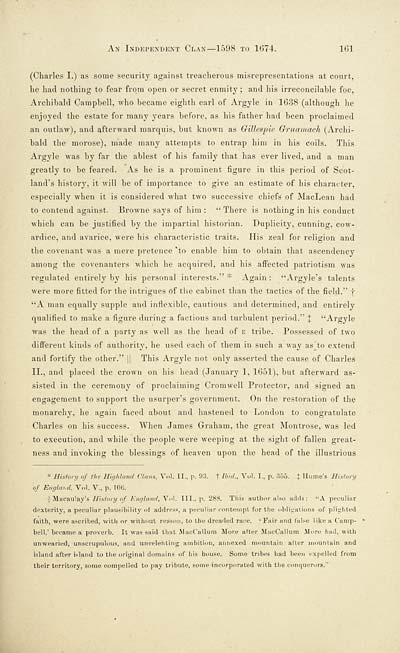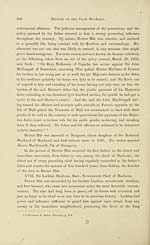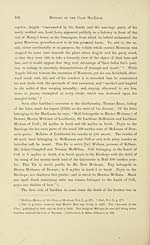History of the Clan MacLean from its first settlement at Duard Castle, in the Isle of Mull, to the present period
(167) Page 161
Download files
Complete book:
Individual page:
Thumbnail gallery: Grid view | List view

An Independent Clan — 1598 to 1G7-1. 161
(Charles I.) as some security against treacherous misrepresentations at court,
he had nothing to fear from open or secret enmity ; and his irreconcilable foe,
Archibald Campbell, who became eighth earl of Argyle in 1638 (although he
enjoyed the estate for many years before, as his father had been proclaimed
an outlaw), and afterward marquis, but known as Gillespie Gruatnach (Arciii-
bald the morose), made many attempts to entrap him in his coils. Tliis
Argyle was by far the ablest of his family that has ever lived, and a man
greatly to be feared. As he is a prominent figure in this period of Scot-
land's history, it will be of importance to give an estimate of his character,
especially when it is considered what two successive chiefs of MacLean had
to contend against. Browne say^s of him : " There is nothing in his conduct
which can be justified by tlic impartial historian. Duplicity, cunning, cow-
ardice, and avarice, were his characteristic traits. His zeal for religion and
the covenant was a mere pretence 'to enable him to obtain that ascendency
among the covenanters which he acquired, and his affected patriotism was
regulated entirely by his personal interests." * Again : "Argyle's talents
were more fitted for the intrigues of the cabinet than the tactics of the field." f
"A man equally supple and inflexible, cautious and determined, and entirely
qualified to make a figure during a factious and turbulent period." % "Argyle
was the head of a party as well as the head of c tribe. Possessed of two
different kinds of authority, he used each of them in such a way as to extend
and fortify the other." || This Argyle not only asserted the cause of Charles
II., and placed the crown on his head (January 1, 1651), but afterward as-
sisted in the ceremony of proclaiming Cromwell Protector, aii<l signed an
engagement to support the usurper's government. On the restoration of the
monarchy, he ajrain faced about and hastened to London to congratulate
Charles on his success. When James Graham, the great Montrose, was led
to execution, and while the people were weeping at the sight of fallen great-
ness and invoking the blessings of heaven upon the liead of the illustrious
® Hislory of the Highlmul Ctiiiis, Xo], II., p. 93. t I'jU/., Vol. I., p. Zb^. + Hume's Hlsiory
of EngUv.d, Vol. V., p. lOU.
II Macaulay's y/is/oji/ of h'.nglnml,\o\. III., p. 288. This Hutlior iilso ndds: "A peculiar
dexterity, a peculiar plausibility of address, a peculiar conteuipt for the obliLiations of plighted
faith, were ascribed, witli or without reason, to the dreaded race. 'Fair and false like a Camp-
bell,' became a proverb. It was said that .MacCalhim More after MacCallum .More had, with
unwearied, unscrupulous, and unreletitini; ambition, aniie.xed mountain alter mountain and
island after island to tlie original domains of fiis house. Some tribes had been expelled from
their territory, some compelled to pay tribute, some incorporated with the conquerors."
(Charles I.) as some security against treacherous misrepresentations at court,
he had nothing to fear from open or secret enmity ; and his irreconcilable foe,
Archibald Campbell, who became eighth earl of Argyle in 1638 (although he
enjoyed the estate for many years before, as his father had been proclaimed
an outlaw), and afterward marquis, but known as Gillespie Gruatnach (Arciii-
bald the morose), made many attempts to entrap him in his coils. Tliis
Argyle was by far the ablest of his family that has ever lived, and a man
greatly to be feared. As he is a prominent figure in this period of Scot-
land's history, it will be of importance to give an estimate of his character,
especially when it is considered what two successive chiefs of MacLean had
to contend against. Browne say^s of him : " There is nothing in his conduct
which can be justified by tlic impartial historian. Duplicity, cunning, cow-
ardice, and avarice, were his characteristic traits. His zeal for religion and
the covenant was a mere pretence 'to enable him to obtain that ascendency
among the covenanters which he acquired, and his affected patriotism was
regulated entirely by his personal interests." * Again : "Argyle's talents
were more fitted for the intrigues of the cabinet than the tactics of the field." f
"A man equally supple and inflexible, cautious and determined, and entirely
qualified to make a figure during a factious and turbulent period." % "Argyle
was the head of a party as well as the head of c tribe. Possessed of two
different kinds of authority, he used each of them in such a way as to extend
and fortify the other." || This Argyle not only asserted the cause of Charles
II., and placed the crown on his head (January 1, 1651), but afterward as-
sisted in the ceremony of proclaiming Cromwell Protector, aii<l signed an
engagement to support the usurper's government. On the restoration of the
monarchy, he ajrain faced about and hastened to London to congratulate
Charles on his success. When James Graham, the great Montrose, was led
to execution, and while the people were weeping at the sight of fallen great-
ness and invoking the blessings of heaven upon the liead of the illustrious
® Hislory of the Highlmul Ctiiiis, Xo], II., p. 93. t I'jU/., Vol. I., p. Zb^. + Hume's Hlsiory
of EngUv.d, Vol. V., p. lOU.
II Macaulay's y/is/oji/ of h'.nglnml,\o\. III., p. 288. This Hutlior iilso ndds: "A peculiar
dexterity, a peculiar plausibility of address, a peculiar conteuipt for the obliLiations of plighted
faith, were ascribed, witli or without reason, to the dreaded race. 'Fair and false like a Camp-
bell,' became a proverb. It was said that .MacCalhim More after MacCallum .More had, with
unwearied, unscrupulous, and unreletitini; ambition, aniie.xed mountain alter mountain and
island after island to tlie original domains of fiis house. Some tribes had been expelled from
their territory, some compelled to pay tribute, some incorporated with the conquerors."
Set display mode to:
![]() Universal Viewer |
Universal Viewer | ![]() Mirador |
Large image | Transcription
Mirador |
Large image | Transcription
Images and transcriptions on this page, including medium image downloads, may be used under the Creative Commons Attribution 4.0 International Licence unless otherwise stated. ![]()
| Histories of Scottish families > History of the Clan MacLean from its first settlement at Duard Castle, in the Isle of Mull, to the present period > (167) Page 161 |
|---|
| Permanent URL | https://digital.nls.uk/94803890 |
|---|
| Description | A selection of almost 400 printed items relating to the history of Scottish families, mostly dating from the 19th and early 20th centuries. Includes memoirs, genealogies and clan histories, with a few produced by emigrant families. The earliest family history goes back to AD 916. |
|---|

